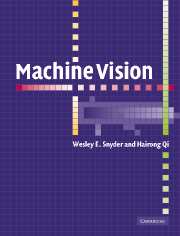Book contents
- Frontmatter
- Contents
- To the instructor
- Acknowledgements
- 1 Introduction
- 2 Review of mathematical principles
- 3 Writing programs to process images
- 4 Images: Formation and representation
- 5 Linear operators and kernels
- 6 Image relaxation: Restoration and feature extraction
- 7 Mathematical morphology
- 8 Segmentation
- 9 Shape
- 10 Consistent labeling
- 11 Parametric transforms
- 12 Graphs and graph-theoretic concepts
- 13 Image matching
- 14 Statistical pattern recognition
- 15 Clustering
- 16 Syntactic pattern recognition
- 17 Applications
- 18 Automatic target recognition
- Author index
- Index
10 - Consistent labeling
Published online by Cambridge University Press: 05 June 2012
- Frontmatter
- Contents
- To the instructor
- Acknowledgements
- 1 Introduction
- 2 Review of mathematical principles
- 3 Writing programs to process images
- 4 Images: Formation and representation
- 5 Linear operators and kernels
- 6 Image relaxation: Restoration and feature extraction
- 7 Mathematical morphology
- 8 Segmentation
- 9 Shape
- 10 Consistent labeling
- 11 Parametric transforms
- 12 Graphs and graph-theoretic concepts
- 13 Image matching
- 14 Statistical pattern recognition
- 15 Clustering
- 16 Syntactic pattern recognition
- 17 Applications
- 18 Automatic target recognition
- Author index
- Index
Summary
On axis, as the planets run,
Yet make at once their circle round the sun;
So two consistent motions act the soul;
And one regards itself and one the whole.
Alexander PopeThe single most challenging problem in all of computer vision is the “local/global inference problem.” As in the fable of the blind men and the elephant, the computer must, from a set of local measurements, infer the global properties of what is being observed. In other words, the next level of the machine vision problem is to interpret the global scene (which is composed of individual objects) using local information about each object obtained from segmentation and shape analysis as we have discussed in Chapters 8 and 9. One way to approach the local/global inference problem is to introduce the concept of consistency.
Consistency
Let's begin with some notation: Define a set of objects {x1, x2, … xn}, and a set of labels for those objects {λ1, λ2, … λk}, which we assume for now are mutually exclusive (each object may have only one label) and collectively exhaustive (each object has a label). Denote a labeling as the ordered pair (xi, λj). By this notation, we mean that object i has been assigned label j.
As an example of consistent labeling, we will consider the problem of labeling objects in a line drawing.
Information
- Type
- Chapter
- Information
- Machine Vision , pp. 263 - 274Publisher: Cambridge University PressPrint publication year: 2004
